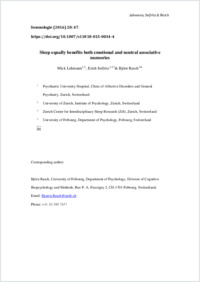Sleep benefits emotional and neutral associative memories equally
- Lehmann, Mick Clinic of Affective Disorders and General Psychiatry, Psychiatric University Hospital, Zurich, Switzerland / Institute of Psychology, University of Zurich, Zurich, Switzerland
- Seifritz, Erich Clinic of Affective Disorders and General Psychiatry, Psychiatric University Hospital, Zurich, Switzerland / Institute of Psychology, University of Zurich, Zurich, Switzerland
- Rasch, Björn Zurich Center for Interdisciplinary Sleep Research (ZiS) / Department of Psychology, Division of Cognitive Biopsychology and Methods, University of Fribourg, Rue P.-A.-Faucigny 2, 1701, Fribourg, Switzerland
-
2016
Published in:
- Somnologie. - 2016, vol. 20, no. 1, p. 47-53
English
Background: Emotions modulate memory. It has been suggested that sleep contributes to improved memory of emotional events by preferentially consolidating emotional memories, presumably because of a selective off-line reactivation of information relevant to future behavior. Objectives: We aimed to validate sleep-dependent memory consolidation in a new associative emotional memory paradigm suitable for inducing memory reactivations during sleep. We hypothesized that sleep preferentially might benefit the consolidation of emotional associations independently of their negative vs positive emotional valence. Methods: Seventy-two healthy young participants performed an associative emotional memory task in either the evening or the morning. During the task, they were asked to associate neutrally spoken words to neutral, negative or positive pictures. Cued recall was tested after a 12-h retention interval filled with either night-time sleep or daytime wakefulness. Results: Generally, emotional associations were better remembered than neutral ones. However, we were not able to replicate a selective benefit of sleep on emotional memory. Sleep robustly improved the cued recall performance of all picture types compared with wakefulness, without any modulating influence of emotional arousal or valence. Conclusions: We conclude that the consolidation of explicitly learned associations benefits from sleep, independent of emotional arousal or valence. Selective emotional memory consolidation during sleep may be restricted to non-associative item memory or incidentally learned emotional associations.
- Faculty
- Faculté des lettres et des sciences humaines
- Department
- Département de Psychologie
- Language
-
- English
- Classification
- Psychology
- License
-
License undefined
- Identifiers
-
- RERO DOC 323248
- DOI 10.1007/s11818-015-0034-4
- Persistent URL
- https://folia.unifr.ch/unifr/documents/306927
Statistics
Document views: 158
File downloads:
- Texte intégral: 227
